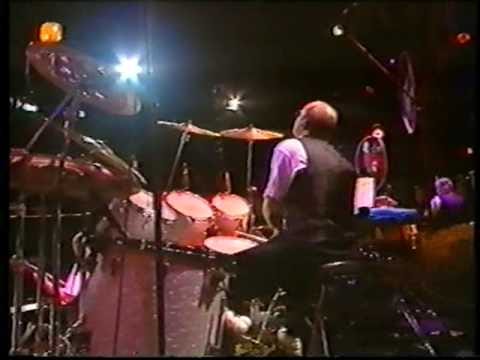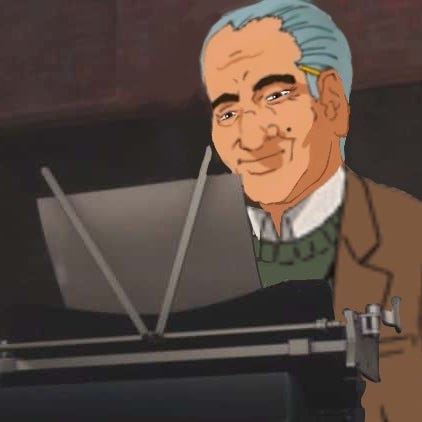Once fortunes were made in the record business, and my lord, Phil Collins made a bundle. Just thinking about all the hits he made in the 1980s: Seven number one singles, and somehow that did not count "In the Air Tonight" (1981), which is the song I most associate with his solo career. "One More Night," "Sussidio," "Another Day in Paradise," even a cover of "A Groovy Kind of Love," from the 1988 movie called Buster, starring Collins in that tireless British film trope, a crime-sort-of-does-pay story based on The Great Train Robbery.
And let us not forget Genesis, for which Collins was the drummer and, after Peter Gabriel left in 1975, the band's lead singer. Genesis also sold scads of records in the 1980s, including the number one single "Invisible Touch." Collins was everywhere, and yet a kind of invisible man as well. The songs were so ubiquitous, you didn't have to turn on the radio to hear them. They were the backbone of every adult contemporary station in the world, which meant, you know, doctor's offices, dental offices, wherever people involved in the front office of any business enterprise had to work together. Not only in the air tonight, but in the air all day.
By the end of the 20th century, Collins could afford to do projects that cost more than they could possibly earn. I spoke to him in 1998 for a cover feature for the New York Daily News Sunday entertainment section. Collins was drumming up interest for his forthcoming performance at Carnegie Hall, where he was to appear with a jazz big band. He would be the drummer, not the singing drummer, although there might be exceptions. One sensitive topic for Collins: the need for corporate sponsorship to take the project on the road in America.
WR: HOW BIG IS THE BAND?
Phil: There were 20 last night, and I hope there are 20 tonight, not counting the singers. Six saxophones. Five trombones, five trumpets, percussion. You can say...
IT MUST COST A LOT TO MOVE THAT MANY PIECES AROUND.
That’s why we have a sponsor. I know that 'sponsor' has become a dirty word with rock and roll, but with a jazz big band it's inevitable. One of the reasons big bands started having problems, aside from a shifting in musical tastes, is that it became too expensive. But fortunately, Private Issue came to the rescue. Otherwise I wouldn’t be here doing it. I'd just be doing it in Europe. (Private Issue by Discover was a credit card.)
WR: PRIVATE ISSUE IS NOT EXACTLY BUDWEISER...
Phil: What are you saying, are you pro or anti?
WR: EVER SINCE BOB DYLAN ALLOWED "THE TIMES THEY ARE-A CHANGIN'" TO BE USED IN AN AD FOR COOPERS & LYBRAND ACCOUNTANTS, THE QUESTION IS MOOT.
Phil: Well, it depends if you can sleep at night. I don't take millions of bucks in sponsorship, I don't take anything near that, and put half of it into the charity stuff that I do, and the sponsor matches it. As far as I’m concerned, there are people who just take the sponsor’s money and run, the ticket prices stay the same, and there’s no particular advantage except for the artist. And because of the stuff I've been trying to do, for the homeless since 1989, even in Europe, this last tour, "Darkness and Light " Toyota was helping us out. They were funding projects, we were funding projects, that had been up and running for a few years, and we gave them large donations to keep them running in whatever cities we played. If they match that, I get them to do what I want to do, and in return they underwrite some of the tour costs. I can live with that.
HAS MONTREUX (JAZZ FESTIVAL) HAPPENED YET? ARE YOU PLAYING THERE?
Two years ago we did Montreux, 1996, we did eight shows in Europe. Our first gig was for the Queen and Mandela in London, then we did Montreux. Ahmet [Ertegun] was there, Quincy Jones was conducting, and Tony Bennett was our guest singer. This time around, we have Oleta Adams singing with us. Quincy was in L.A. with us, and came out and conducted some of the tunes.
WHO IS THE DAY-TO-DAY CONDUCTOR?
Me! It's my band! (comically, like the kid who names himself quarterback because it’s his football). I'm just kidding. It's an old Buddy Rich line. No, we run without a pilot. Even with Quincy we rehearsed without him and he rehearsed with us the last 2 or 3 days. To be honest, my piano player does some of the conducting of the things that aren’t led by drums, and I conduct the rest.
ARE YOU PLAYING DRUMS?
I'm playing drums totally. Some people expect me to sing. It is advertised, we've been doing our best to tell everybody, that this is a [mostly] instrumental evening. I'm playing the drums. The end of the show, the encores, if the audience has been good boys and girls, I get up and sing a couple of songs, and a percussionist takes over on drums. But the thrust of the evening is Genesis tunes, and my tunes, which have been arranged for big band. We have Gerald Albright featured on saxophone, Oleta Adams comes out and sings for about half an hour in the middle, a mixture of Sarah Vaughan and her own tunes. It's a big band evening: We all wear the same stuff. I don't sing. The enjoyment for me comes as being the drummer in this.
That's where I started off life. I've wanted to do this since 1966, when I saw the Buddy Rich Band, and the Count Basle Band with Sonny Payne and later HaroId Jones. These were my idols, along with the Beatles and Motown and the Atlantic label stuff, I was listening to that, and Elvin Jones with John Coltrane. I had a very wide musical taste when I was a teenager, and still do. I said I wanted to do this one day. It takes awhile to be mature enough to deal with it. It's a very deep musical style, you really have to do homework. It's something I want to do now til I drop. It's a big big love affair.
DID YOU FIND SOME OF THE STUFF FROM GENESIS OR YOUR SOLO CAREER LENT THEMSELVES BETTER TO THESE ARRANGEMENTS THAN OTHERS?
Certainly, I sat down with Harry Kim, who's my musical director, he plays trumpet with the Phenix Horns. (The Earth, Wind & Fire horn section.) We discussed what tunes lent themselves best. Sometimes you take a punt with it, you don't know... "Invisible Touch," the Genesis tune, we went to Sammy Nestico, who used to arrange for Basie, and he came back with a wonderful Basie-esque arrangement for us. He did about half a dozen of the arrangements. John Clayton Jr., another fantastic arranger, did seven for us. Some of them work incredibly well: You give them a four chord tune and they come back with something that sounds like it was written as a jazz tune. That's their magic, the arranger's magic.
David Stout did "Two Hearts," "In the Air Tonight, "Don't Lose My Number." "Milestones," a Miles Davis song. Two songs I sing, Jerome Kern's "The Way You Look Tonight," and Duke Ellington's "Do Nothing Til You Hear from Me," which I did with Quincy on his last album. He wanted to conduct, because he wants people to take it seriously. He takes it seriously.
HAS THIS BEEN INVIGORATING, HAS IT LIT A FIRE UNDER YOU?
I've never felt as complete. When I go onstage, I've never felt as complete and excited as I do with this band. I feel sometimes I've been side-tracked into singing. Literally, in fact, from the day I took over from Peter Gabriel, when he left Genesis. I did it because we couldn’t find anybody else. It wasn't really what I wanted to do with my life. I wanted to be a drummer. And so to come back to sitting inside a band, to do something l've wanted to do for 32 years, kicking along a band is what I've always wanted to do.
I still write songs, I'm writing songs for this Tarzan movie for Disney. I’ve been working on songs for that for the last three years, and that's a kind of work I've never done before, which I'm finding very, very exciting. I hope to do more of that, and hope to get offers to do some underscore stuff, that's what I'd really like to do. I still write songs, I'll still make albums, but this is something that I can use the tools I know how to use best, the drums, to best advantage.
HAVE YOU EVER PLAYED CARNEGIE HALL?
Never have. It's got that legendary, austere name to it.
DO YOU KNOW HOW TO GET TO CARNEGIE HALL?
You practice. And I have been practicing for 27 years for this moment.




